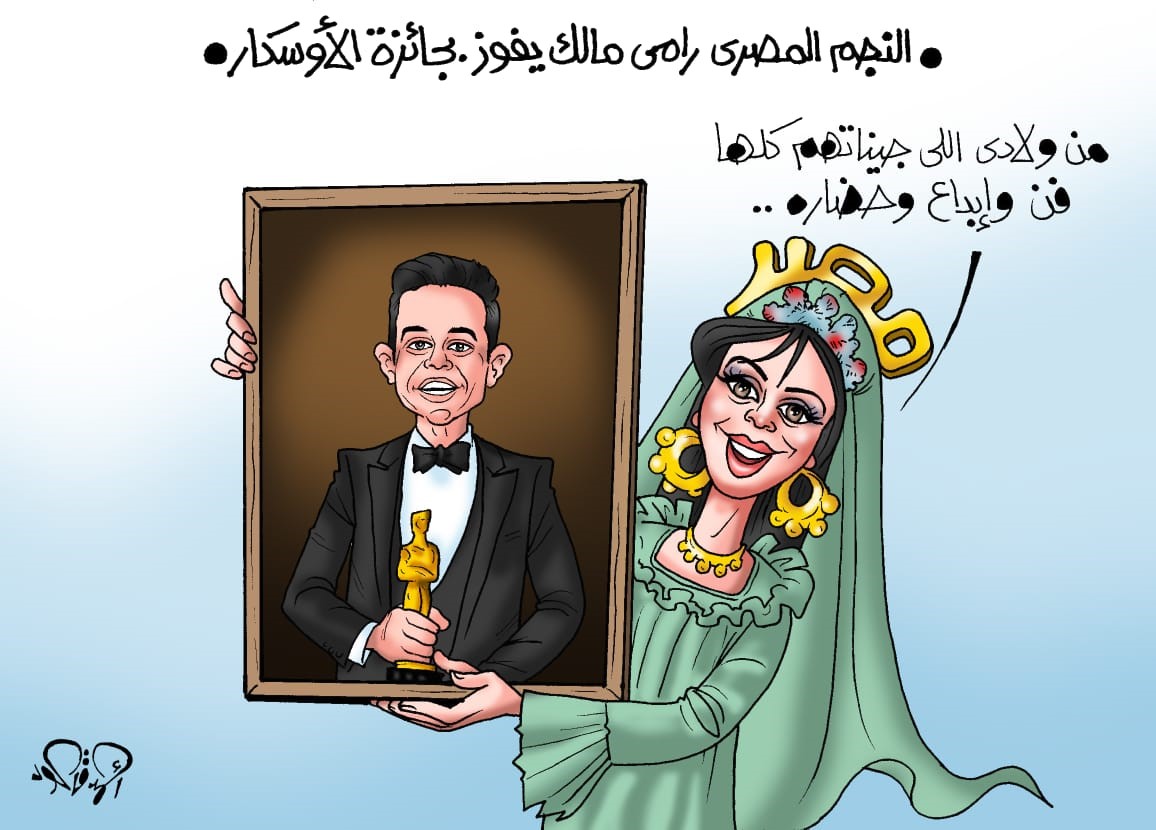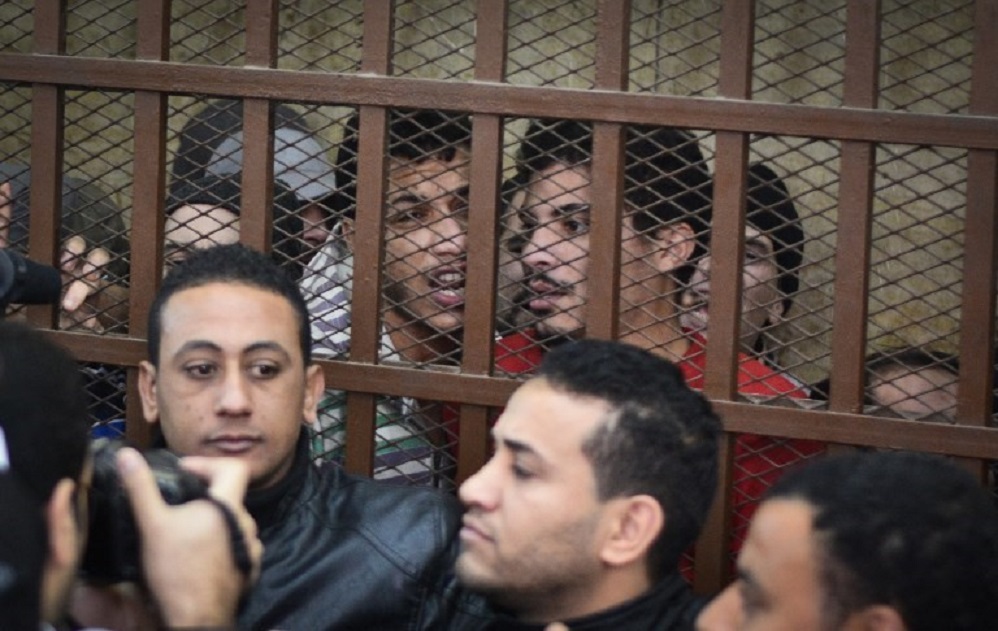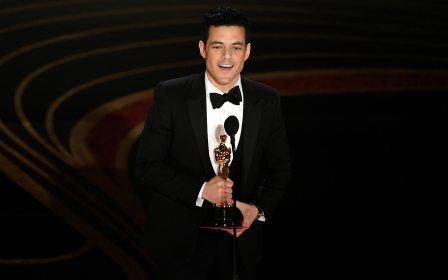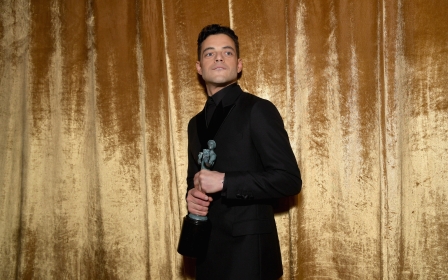Rami Malek is a hero in Egypt after playing a gay icon - but LGBT people there are under attack
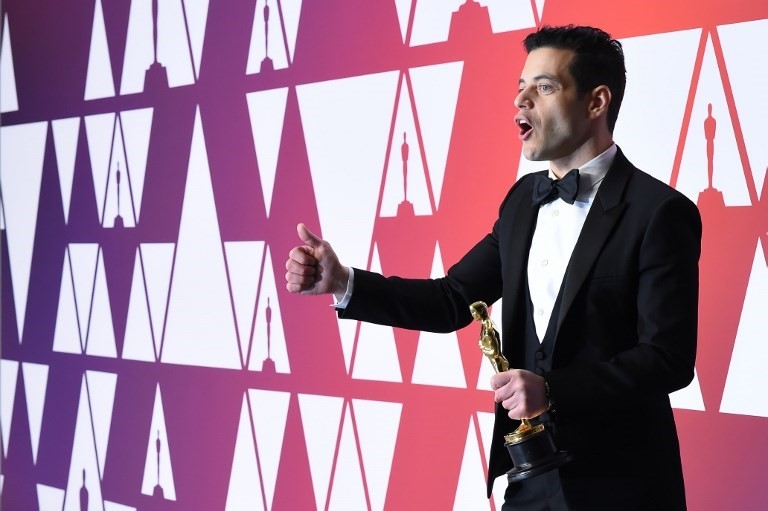
On Oscars night 2019, Laila, 28, and Omar, 32, two young gay Egyptians, stayed up all night to watch the 91st Academy Awards ceremony and root for Rami Malek. The American-Egyptian actor was nominated in the best actor award category for his role as flamboyant gay rock icon Freddie Mercury in Bohemian Rhapsody.
Malek went on to win, becoming the first actor of Egyptian heritage to win the best actor Oscar. The win prompted a flurry of nationalist celebration from the Egyptian government and pro-state media, which seemed to have conveniently forgotten its own record on LGBQT rights.
“I was excited about Rami winning, but I knew that the state would try to take credit,” said Laila, a graphic designer, who - like Omar - did not want to use her full name for safety reasons.
Stay informed with MEE's newsletters
Sign up to get the latest alerts, insights and analysis, starting with Turkey Unpacked
One of the first officials to congratulate Malek was Egypt's minister of immigration, Nabila Makram, praising the actor's acceptance speech where the actor stated that he was "the son of immigrants from Egypt".
But, Makram, who is one of Egypt's top prosecutors of LGBT individuals, conveniently ignored the part of Malek's acceptance where he said: “We made a film about a gay man, an immigrant, who lived his life just unapologetically himself”.
Similarly, Egypt’s embassy in Washington expressed joy at Malek's win, saying that the actor has made all Egyptians so proud.
A missed opportunity
Laila and Omar had hoped Malek would use his win to show solidarity with Egypt's beleaguered gay community, who have faced intensified persecution in recent years.
“I wish he stood up and dedicated this prize to members of the LGBT community in the Arab world. I am disappointed that he didn’t speak up,” Omar told Middle East Eye.
“As an actor I like him. But after his statement that he supports the Egyptian government, I feel he is one of those tourists who only read about Egypt from tourist brochures.”
Being gay in Egypt means that you face daily death threats, molestation, harassment, and possibly jail time
- Nagy, lawyer
In 2015, Malek spoke about the events of 2013 that brought the current president to power to the privately owned newspaper Al-Masry Al-Youm.
“I believe that the June 30 revolution saved Egypt from a civil war," Malek was quoted as saying, "and that President Abdel Fattah al-Sisi deals with Egyptians as equal citizens, regardless of their religion, which is the right thing to do.”
On 30 June 2013, hundreds of thousands of Egyptians took to the streets to protest against the government of Mohamed Morsi, Egypt's first elected president, who came to power as the Muslim Brotherhood candidate. Three days later, Sisi overthrew him in a coup that was followed by a bloody crackdown on his supporters.
Some people believed the new Sisi-led government would act to protect minorities, including the gay community - but reality turned out very differently. Persecution of homosexuality has increased under Sisi, particularly since a 2017 crackdown, say human rights groups.
Homosexuality is not explicitly illegal under the Egyptian judicial system. Instead LGBT individuals who are arrested are legally persecuted by the 1961 prostitution law. The law considers consensual homosexual conduct as prostitution, and most cases are first handed to the vice police at the Ministry of Interior.
Convicted individuals can spend between one and three years in jail.
“People have to know that being gay in Egypt doesn’t just mean that you can be kicked out of a job or your flat, it means that you face daily death threats, molestation, harassment, and possibly jail time,” Nagy, a 41-year-old lawyer, told Middle East Eye.
Nagy was arrested in 2017 when Egyptian authorities detained dozens of people after rainbow flags were displayed at a pop concert in Cairo. He was later released.
“If he [Malek] had been ‘fully Egyptian’ with no American passport, he would be now wanted or even arrested for playing a gay character,” added Nagy.
In Egypt, the country’s top media body issued a decree in September 2017 “banning the appearance of homosexuals or promotion of their slogans”, which it justified by saying, "Homosexuality is a disease and a shame which should be hidden till it is treated, not promoted."
Hostile environment
Hundreds of gay and transgender individuals have been arrested in Egypt in recent years, with many of them citing ill treatment, harassment, rape and humiliation as a common feature for detainees.
In addition to prison sentences, LGBT people face hostile conservative media campaigns that describe them as “deviants”, “mentally ill” or “molesters”.
For example, the ultra-nationalist, pro-army newspaper Youm7 described Malek’s win as a “victory to Egypt’s genes of art, creativity and civilisation”. Nevertheless, the same newspaper reported the “arrest of four deviants in Damietta” only days before.
'This is the first time I hope someone is held in solitary confinement and not in a cell'
- Mohamed, friend of transgender activist Malak al-Kashif
The arrests took place on Valentine’s Day, 10 days before the 91st Academy Awards ceremony, when police forces raided a private residency in the city of Damietta arresting five gay men.
Saed, a 23-year-old student, whose name has been changed for his safety, was one of them, but because he had connections within the local security services, he was able to be released before the case paper was written.
However, he stayed one night in a police station in Damietta. “They … insisted that we go to the station half-naked,” Saed told Middle East Eye.
According to Saed, he and his friends were partying and “minding their own business”, when the doorman told the police about them.
“We became the puppet show of the night. Even the people who are accused of theft and murder had their fun. The informants called us faggots and beat us with sticks and the back of the rifles as if we were terrorists,” he said.
Saed is free, but his friends are still in detention and are being questioned in front of the prosecution.
“I don’t want to imagine what is happening to them in detention," Saed said. "During the night I spent, the policemen told the inmates that we are ‘sissies’. Some even refused to look at us, while the others kept harassing us."
He said that his four friends underwent forced anal medical examinations so the authorities could decide whether they are "habitable homosexuals" or not.
A common trend
Ill treatment in detention is common for LGBT individuals who are arrested in Egypt. The Egyptian Initiative for Personal Rights said in a report in 2017 that gay and transgender individuals who are detained are often subjected to “vicious beatings, persistent insults in police stations and threats of sexual violence".
“Some have been threatened with being placed in a cell with other prisoners who have been incited to rape them,” the report added.
The same fears Saed has for his friends in detention were echoed by Mohamed, who is a friend of 19-year-old transgender activist Malak al-Kashif, who was was arrested on 6 March.
Her whereabouts are still unknown: her friends believe that her arrest was part of a crackdown on activists after protesters took to the streets and online, demanding justice for the 22 people killed in the train crash at Cairo's main station last month.
The Al-Watan pro-government newspaper reported on 7 March that al-Kashif was arrested for “calling for protests". She is a vocal supporter of LGBT rights, and was arrested from her house in Giza, Mohamed said.
Her family and friends fear that since her gender on her official papers has not yet been changed, that she will have to stay in a cell with male inmates.
“I have to say it. This is the first time I hope someone is held in solitary confinement and not in a cell,” Mohamed said, adding that Kashifs friends have been searching police stations and prosecution buildings across Cairo and Giza to locate her.
Shortcomings laid bare
Malek has been caught up in other controversies surrounding Bohemian Rhapsody. At the world premiere in London last October, AIDS activist group Act Up protested to raise awareness about the condition (Freddie Mercury from it in 1991 at just 45).
At the time, Malek said: “We’ve been progressive with so many issues currently. Politically, everybody is having a bit more of a voice, but it’s still not quite what it needs to be. There are so many more hurdles that we need to scale …"
In Egypt, those LGBQT individuals struggling to be heard are still waiting - and fearing the worst.
All of those spoken to by Middle East Eye for this article did not want their full names to be revealed, for fear of persecution.
Middle East Eye delivers independent and unrivalled coverage and analysis of the Middle East, North Africa and beyond. To learn more about republishing this content and the associated fees, please fill out this form. More about MEE can be found here.


